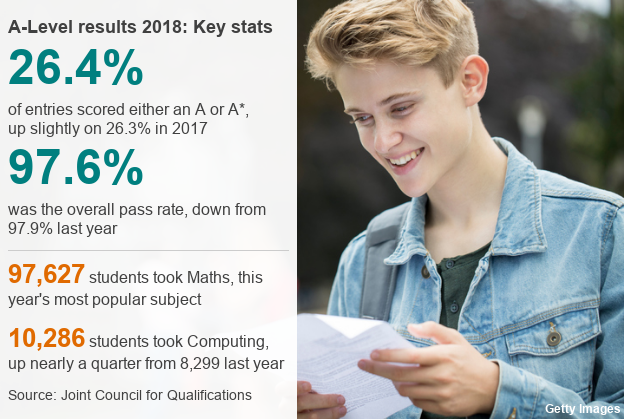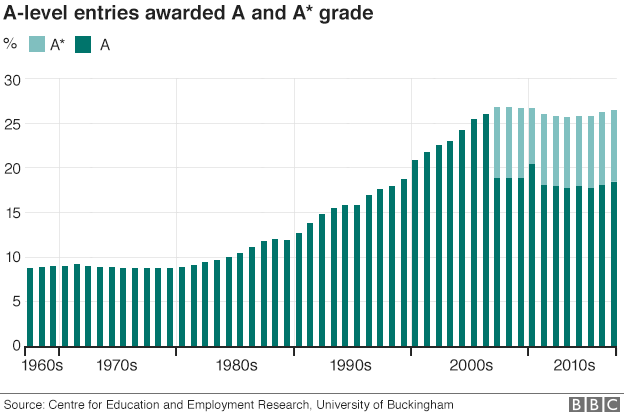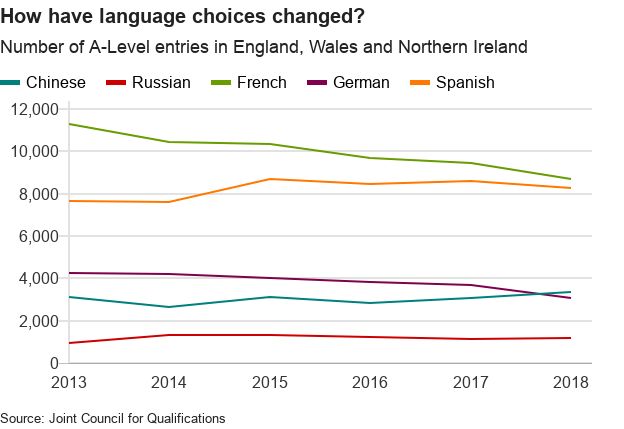A-level students have been awarded the highest proportion of As and A*s since 2012, amid changes toughening the exams in England.
Some 26.4% of exams have been awarded these top grades this year - but the proportion gaining A* to C dropped to 78.4% from 79% last year.
England's exams regulator has said the results show a steady national picture at a time of significant change.
Pupils in England, Wales and Northern Ireland are finding out their results.
Overall, 97.6% of A-level entries were awarded A* to E grades.

Examiners dismissed the rise in top grades as "extremely marginal", while Ofqual has underlined that results have remained steady.
In 2012, 26.6% of exams were awarded As and A*s. And in 2017, 26.3% achieved these top grades.
- A-level results 2018: We answer your questions
- What's new about this year's A-levels?
- Clearing: "It's not the end of the world"
- Unconditional university offer 'gave me confidence'
- Welsh students see rise in top grades
Why is this year different?
In England, A-levels have been moving away from coursework and returning to students being graded on final exams.
However, a mix of old-style and new exams are being taken in Wales and Northern Ireland.
Last year, students in England took new, more challenging exams in 13 subjects, with 11 more following this year. The remaining subjects are being refreshed over the next two years.
Regulator Ofqual promised grade boundaries could be lowered, once papers were marked, if the new exams were tougher than expected.

A-levels have also been separated from AS-levels in England, leading to a significant decline in the numbers sitting the separate exam at the end of the first year.
What else do the results show?
For the second year running, boys have outperformed girls at the top grades.
Last year, this happened for the first time in 17 years, amid the move to the new-style exams.
This year 26.6% of exam entries for boys were awarded an A or A*, compared with 26.2% of girls.
This compares with 26.6% and 26.1% respectively last year.
There has been a rise in the number of students taking Stem (science, technology, engineering and maths) subjects.
These subjects accounted for over a third of A-level entries, but are still favoured by boys.

How have people reacted?
Education Secretary Damian Hinds congratulated everyone receiving their results.
He said: "It is the culmination of a lot of hard work and dedication - from both those receiving their marks and the teachers who've been supporting them every step of the way.
"They should rightly feel proud of their achievements."
But Geoff Barton, head of the Association of School and College Leaders, said the sheer weight of the changes had placed an intolerable additional strain on staff and students.
"We have no doubt that this has affected the mental health and wellbeing of a proportion of young people and teachers," he said.
He urged the government to pay heed and ensure any future changes were introduced in a more manageable and considered manner.
What about university places?
Ucas figures show 411,860 students have taken university places so far - down 1% on last year.
But a record 27.9% of the 18-year-old population have already been accepted.
A dip in the number of 18-year-olds, due to a lower birth rate in 2000, means universities are looking to fill their places
Even the more selective universities are offering places to students through clearing which is the process by which universities fill their unallocated course places.
There has also been a rise in unconditional offers and other ways of attracting students, such as bursaries.

Ucas said that last year about one in eight people accepted to full-time university courses got there through clearing.
This year, 30,000 courses are available through the Ucas system.
What about those not taking A-levels?
For students who took Btec qualifications, results were released on Wednesday.
Btecs, which also count towards Ucas points, are specialist work-related qualifications, designed for young people interested in working in a particular sector or industry.
And in Scotland, results for Highers and Advanced Highers were published last week.
This year, there were 147,000 Higher passes, with a pass rate of 76.8% - down slightly from 77% last year.
Correction: An earlier version of this story incorrectly reported the exact percentage figures relating to the proportion of exam entries by boys and girls awarded an A or A*. These have now been amended.
Source:bbc.com






No comments:
Post a Comment